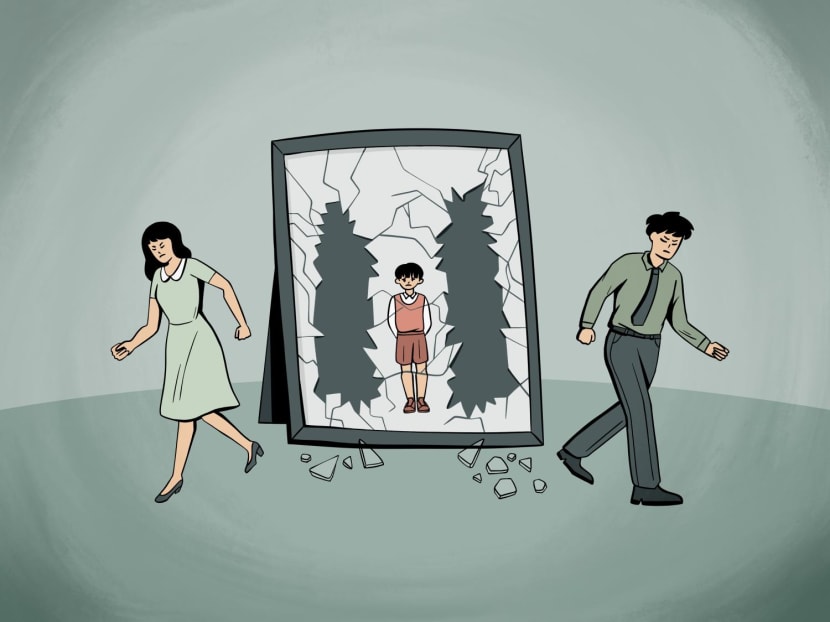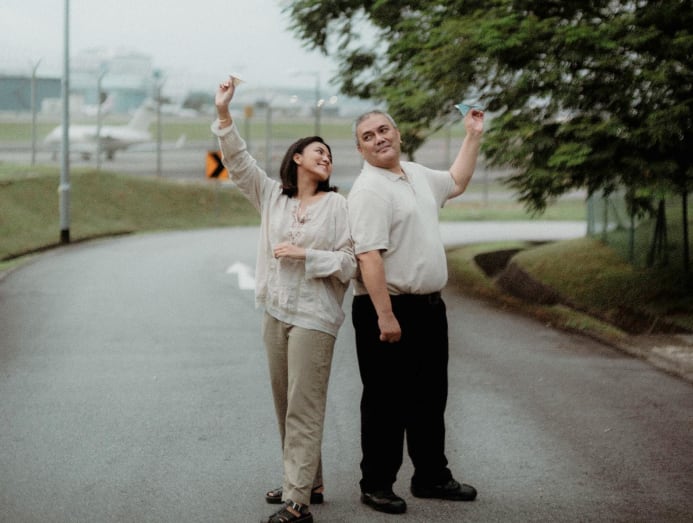How abuse, parents' divorce and living with mentally unwell persons can affect a child's lifelong health and relationships

- In the first of a four-part series on adverse childhood experiences — ahead of World Infant, Child and Adolescent Mental Health Day on April 23 — CNA TODAY speaks to medical professionals and people who work with children to raise awareness on the adverse and traumatic situations that children in Singapore face and how these experiences may set the stage for mental and physical health problems later in the children's life. Hear also from people who have found a way to heal and made peace despite their childhood adversities
- The second addresses what health and social work professionals do to help these children
- The third carries the accounts of two women who grew up in households where there was domestic violence
- The fourth examines how to process past hurts and practise forgiveness when you have had a difficult or traumatic childhood
- Please be advised that the articles delve into trauma-related topics that may be triggering to the reader
On Oct 31 in 2000, three-year-old Diyana Amir was at home when the SQ006 plane crash that killed 83 of the 179 people onboard happened.
Her father Amir Husin, who had been a cabin crew member then, survived the aviation disaster.
The ill-fated Singapore Airlines Boeing 747-400 plane carrying 159 passengers and 20 crew members — some of whom were Singaporeans — was to fly to Los Angeles, United States from Taipei, Taiwan.
During take-off at around 11.20pm, the plane hit construction equipment, fell back onto the runway, broke apart and burst into flames.
Four crew members and 78 passengers died. Another passenger died from severe burns days later.
The tragedy would go on to change Ms Diyana’s childhood.
Once “the playful parent” she looked to for fun activities, her father became solemn and reserved after that, isolating himself in a room at home most of the time.
Despite her young age then, she sensed that something had changed drastically.
Now aged 23, the entertainment producer and filmmaker has written and directed a short film called Paper Planes, Don’t Always Soar — inspired by her childhood experience living with her father’s post-traumatic stress.
She told TODAY: “My mother, the only adult at home, and I were constantly vigilant and alert.
“We had to halt our daily routines because certain triggers, like the smell of fire or a lit gas stove while cooking, the scent of frangipanis or even my baby brother crying, would set my dad off, leading to anger, irritation or aggression.”
The scent of frangipanis was linked to the burial, funerals and deaths of her dad’s friends and colleagues.
She added: “As a child, it took me a while to comprehend and accept the change in him.”
Growing up with a parent who was mentally unwell, she recalled the difficult period during her childhood: “Unlike my friends who spent their days playing, I found myself taking a more mature role early, supporting my mother and caring for my little brother.
“At the time, it felt unfair, a childhood somewhat ‘lost’.”
Even though this experience is deeply personal, Ms Diyana’s early struggles with adversity are not uncommon.

Every two in three adults in Singapore have experienced at least one adverse childhood experience in their lives before the age of 18.
This was among the key findings of a study here published in the Child Abuse and Neglect Journal in 2020 — the first Singapore study on adverse childhood experiences.
The study was part of the Singapore Mental Health Study 2016 conducted by researchers at the Institute of Mental Health (IMH).
The term “adverse childhood experience” refers to a potentially traumatic situation or event that a person may face or witness while growing up.
Living with a household member who is mentally unwell is just one example.
Research into potentially traumatic events in childhood has highlighted their far-reaching harmful effects, which may persist well into adulthood.
However, not all types of adverse experiences are obviously traumatic, and not every child is affected in the same way.
Some may be able to manage the situation, whereas others require support and help.
Adjunct Associate Professor Daniel Fung, chief executive officer of the Institute of Mental Health (IMH), said: “For example, when you’re young and you have an illness that keeps you in hospital for two months.
"You recover from the illness but that separation from your family could be quite traumatic, and may have repercussions in the longer term.
“That can also be considered potentially traumatic although on the surface, it doesn't appear toxic, but that could potentially be a traumatic event.”
WHAT HARDSHIPS DO SINGAPORE CHILDREN FACE?
In the 2016 IMH study, the most prevalent adverse childhood experience reported was emotional neglect. Around 46 per cent of the adult respondents experienced this.
This was followed by:
- Parental separation, divorce or death of a parent
- A battered mother or female guardian
- Emotional abuse
- Living with a household member who is mentally ill or suicidal
Childhood emotional neglect is when the child’s emotional needs are consistently overlooked, ignored or not adequately met by their caregivers during the formative years.
When asked what emotional neglect might look like in families, Dr Fung from IMH said: “In today's Singapore context, it would mean that there might be adults around but they are not providing (love and) care for the child.”
In a separate study by the Singapore Children’s Society, which surveyed 270 pairs of caregivers and children from low-income families from 2017 to 2019, the common adverse childhood experiences the children faced were:
- Witnessing community violence such as fights
- Being bullied
- Parental separation or divorce
- Physical abuse
- Household member in prison or who is incarcerated
Ms Toh Sze Min, a research officer with the Singapore Children’s Society, said: “As the sample of children were from low-income families, some possible reasons where these adverse childhood experiences were common could be that children from these families might have lived in neighbourhoods that were less safe.
“They might have been bullied in school because they were not able to fit in with their peers due to the family’s low income.
“Individuals in multi-stressed populations were more vulnerable and at higher risk of offending behaviours that may lead to (serving time in prison).”
HOW TOXIC STRESS AFFECTS THE BRAIN
Dr Yeleswarapu Padmini, senior consultant with the department of child development at KK Women’s and Children’s Hospital (KKH), said that exposure to adverse experiences during the critical early years of life can have significant and lasting effects on cognitive development, and how the person regulates behaviour and emotions.
“These can contribute to difficulties in learning, social interactions and ultimately, have an impact on educational and employment outcomes in the long term.”
Left unchecked, experiencing hardships in childhood can cause toxic stress.
Clinical psychologist Claire Ng said that while some level of stress can be “healthy for development”, stress that is unrelenting, pervasive and overwhelming becomes detrimental.
“Psychological stress is considered ‘extreme’ when it overwhelms the child’s internal capacity and inner resources to cope,” she added.
Ms Ng is with the department of developmental psychiatry and the forensic rehabilitation, intervention, evaluation and network development services at IMH.
Likening extreme stress to a car engine that is revved up for long periods every day, Ms Ng explained: “Eventually, it results in wear and tear that heightens the risk of stress-related physical health issues.
“This (type of stress) is particularly problematic for children as they are undergoing critical developmental periods.
“Toxic stress can affect the brain’s developing structure. This means it doesn’t just affect the child’s current well-being, it also has lasting effects on their capacity to tolerate stressors in the future.”
For example, children who were maltreated were found to have:
- Reduced hippocampus size. This is the area of the brain associated with emotions and memory
- Decreases in volume in the corpus collosum. It connects the left and right side of the brain, which controls processes such as emotion and higher cognitive abilities
- Differences in the development of the pre-frontal cortex, which is responsible for decision-making and self-regulation
WHAT ARE OTHER LONGER-TERM EFFECTS OF ADVERSE CHILDHOOD EXPERIENCES
Findings from research into the long-term health effects are just as troubling.
“Exposure to adverse childhood experiences increases the chance of health problems in adulthood, ranging from cardiovascular diseases, autoimmune disorders, cancers, mental health problems, among others,” Dr Padmini from KKH said.
Ms Toh from Singapore Children’s Society said that findings from its aforementioned 2017 to 2019 study have shown that children who were exposed to more adverse childhood experiences tended to have “poorer life satisfaction, school engagement and social-emotional competence”.
New research based on a nationwide sample of more than 25,000 pairs of twins in Sweden reinforced this.
The Swedish study found that the effects of adverse childhood experience were “dose-dependent”, with each additional adverse experience associated with 52 per cent greater odds of any psychiatric disorder later in life.
The study was published in the Jama Psychiatry peer-reviewed journal last month.
The IMH study found that experiencing just one adverse childhood experience placed the person at a considerably higher risk (3.7 times more likely) of developing a mood or anxiety disorder, compared to those whose childhood were unblemished by an adverse event.
Those with an adverse childhood experience was also 4.2 times more likely to have suicidal thoughts, and plan and attempt suicide.
HOW ADVERSE CHILDHOOD EXPERIENCES AFFECT FUTURE GENERATIONS
The effects of an adverse childhood experience may not end with the victim: Past trauma can affect subsequent relationships and leave an imprint across generations.
Ms Ang Jia Yi, a counsellor at Yishun Family Service at Singapore Children’s Society, said that parents who have experienced childhood trauma themselves may normalise adverse experiences or struggle to recognise that there are healthier alternatives for their children.
“They may unknowingly perpetuate patterns of trauma within the family and expose their children to similar adversities,” she added.
Dr Fung from IMH said that intergenerational transmission of abuse can result in changed behaviour and perception of what normal relationships are.
“For example, for someone who has been coercively abused, whether physical or sexual, they may view relationships as centred around satisfying the needs of the more powerful caregiver.
“When they become caregivers themselves, they may relive that kind of trauma on the next generation, becoming abusers themselves.
“If you study paedophilia and other kinds of sexual disorders called paraphilias, there often is a history of some level of abuse of a similar nature in the childhood, though not all (have experienced childhood abuse),” he added.
Ms Ng the clinical psychologist wanted to stress that not all abuse victims go on to become perpetrators themselves.
“Many victims go on to thrive and experience post-traumatic growth (positive changes after exposure to trauma) where they go on to live meaningful lives.”
Trauma-focused work with children often requires working close with families and communities. A large part of the work is helping children and families understand the impact of trauma on children.
Not everyone who has had a rough childhood suffers irreparable damage, but the potential fallout is significant enough such that researchers and experts are working to find ways to mitigate its effects.
In Singapore, there are programmes and interventions in place to support traumatised children. (More details will be available in the second part of this series.)
Experts told TODAY that it is crucial to address adverse childhood experiences and provide appropriate intervention as early as possible.
“Trauma-focused work with children often requires working close with families and communities.
“A large part of the work is helping children and families understand the impact of trauma on children,” Ms Ng said.
Dr Fung said that education is key.
Understanding what would potentially traumatise a child and its potential impact are an important preventative step.
So is the presence of safe, secure, nurturing relationships in the child’s life, particularly when times are tough.
“Even if a child has gone through a potentially traumatic situation, providing a safe, secure and nurturing environment is actually protective,” Dr Fung said.
“Suppose there’s an accident and the child (is the sole survivor). Can you still save the child (from potential long-term effects of trauma)?
“Yes, you can, if there’s a caregiver who loves them. Maybe a grandparent who can keep them safe, nurture them and help them process what has happened.”
Mr Jeremy Heng, senior clinical psychologist and deputy head of Sunbeam Place at Singapore Children’s Society, a residential home for abused and neglected children, said: “From what we know from research and our work at Children’s Society, the other most important factor is having one consistent safe attachment adult figure, or more, in the child’s life.”

HOW A CHILD FOUND HEALING
Despite his mental health struggles after surviving the plane crash, Mr Amir’s love for his family came through later.
A combination of medical intervention, therapy sessions and unwavering support from family and friends helped him and his family heal.
Ms Diyana said: “There wasn’t a singular defining moment that marked the turning point in my dad’s recovery.
“Instead, it was more of a gradual realisation, a click of understanding that I had observed in him that resonated deeply with me.
“Slowly but surely, we began seeing glimpses of his old self returning.” This was about two years after the disaster.
She recalled that their relationship improved when she was around five years old.
In the short film Paper Planes, Don’t Always Soar, Ms Diyana tried to capture that subtle yet profound shift with a scene of her family huddling together after a storm.
“It symbolised not just the aftermath of a literal storm but also the emotional and psychological challenges we had weathered together,” she said.
“It felt as if my dad suddenly saw us and understood that he wasn’t alone, that we were all there, willing to support him through his struggles.
“That realisation seemed to act as a catalyst for him to begin opening up, allowing himself to be vulnerable and to lean on us as he took steps towards recovery.”
Today, the family has not just “moved on” from the experience; they grew and became stronger as a unit.
“My relationship with my dad is better than ever now. It’s evolved into something truly special… open, fun and deeply connected.
“We enjoy each other’s company and we find joy in the simplest of moments together,” Ms Diyana said.
Her father’s battle with adversity shaped her own approach to handling life’s challenges.
She recalled feeling scared whenever her baby brother cried because that would trigger her father. She would also put on a brave front and help out at home, such as fold her own school uniform.
I’ve come to realise that trying to navigate trauma or any problems in isolation only amplifies the pain and can hinder healing... It’s a reminder that sharing our burdens doesn’t make us weaker but opens the door to support and insight.
Looking back, she realised that she ended up spending more time at home after the incident, and that made her closer to her mother and little brother.
She said that she never felt resentful or bitter. To her, it felt like they were all going through a difficult situation together.
It taught her the value of patience and understanding. Instead of reacting impulsively in times of adversity, it was crucial to pause, reflect and look past the surface of the problem, she added.
“With hindsight, I see the immense impact it had on my personal growth. The experience accelerated my maturity, equipping me with a depth of understanding and empathy that has been invaluable through my teenage years and into adulthood.
“It taught me to navigate complex situations and understand people beyond the surface,” she said.
She also saw how important open communication was in overcoming hard times.
“I’ve come to realise that trying to navigate trauma or any problems in isolation only amplifies the pain and can hinder healing. Speaking up and confiding in people I trust has been important.
“It’s a reminder that sharing our burdens doesn’t make us weaker but opens the door to support and insight.”
That was why she made the film. “Making the film was not just a creative outlet for me, but a deliberate effort to communicate and connect (with people) on issues often shrouded in silence.
“My hope is that by sharing these stories, we can illuminate the shared aspects of our human experience, encourage others to speak up, seek support and find solace in the fact that they are not alone.”
Paper Planes, Don’t Always Soar will screen at an Institute of Mental Health event next Saturday (April 20) from 10.30am to 12.15pm.
Ms Diyana Amir, Dr Daniel Fung, Ms Claire Ng and other mental health experts will discuss the impact of intergenerational trauma on youth mental health. Admission is free. Register for the event here.
WHERE TO GET HELP
- Youth centres under the Singapore Children’s Society
- RoundBox@Children's Society (Toa Payoh): 6259 3735 (Mon to Fri, 9am to 6pm)
- Vox@Children's Society (Chai Chee): 6443 4139 (Mon to Fri, 9am to 6pm)
- JYC@Children's Society (Jurong): 6566 6989 (Mon, Wed and Fri, 8.45am to 5.45pm)
- The Fort@Children's Society (Radin Mas): 6276 5077 (Mon to Fri, 8.30am to 5.30pm)
- Fei Yue's Online Counselling Service: eC2.sg website (Mon to Fri, 10am to 12pm, 2pm to 5pm)
- Institute of Mental Health's Mental Health Helpline: 6389-2222 (24 hours)
- Samaritans of Singapore: 1800-221-4444 (24 hours) / 1-767 (24 hours)
- Singapore Association for Mental Health: 1800-283-7019 (Mon to Fri, 9am to 6pm)
- Silver Ribbon Singapore: 6386-1928 / 6509-0271 (Mon to Fri, 9am to 6pm)
- Tinkle Friend: 1800-274-4788 (Mon to Fri, 2.30pm to 5pm)
- Touchline (Counselling): 1800-377-2252 (Mon to Fri, 9am to 6pm)






